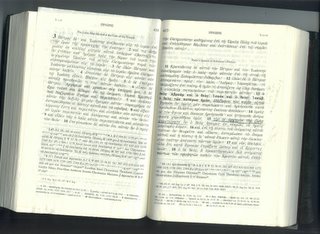
When I became a Christian I took, what some might call, a leap of faith. However, for me it was not quite a leap, as much as a push, or a shove into something I really could never accept outside of a miracle. The history of philosophy has rightly shown us that one question leads to another, rather than to any ‘final’ answer, and surely our whole world has been brought into question. My whole world was brought into question by Jesus Christ, who did not rest at winning my mind over to the Christian worldview, but took my heart as well. He speaks to me in lots of ways, but sadly I have come across no way of controlling these conversations so that I can sit back and scrutinize them with my old questioning eyes. I wish I could meet him at a church or a bar, like those who ran into him in the first century. I wish I could chat with him in the garden, and see what his eyes have to say. But I can’t. I am stuck in a world held by God and mankind to be in question, with only a hope and a Bible.
It has been my recent conviction that evangelicalism, as a shoot growing out of the enlightenment, has pretended to be able to box up this thing called “God’s word” into a Bible. It supposes Humanity can learn the ways of the historical-critical method, master linguistics and archeology, and thus be able to say with confidence “Thus saith the Lord.” This is easy to see, because when you go to Bible college they teach you that you can’t say “Thus saith the Lord” unless you can prove that the Bible teaches it, and you have to be able to prove, using the science of hermeneutics, that what you think the Bible teaches about something is really what those who wrote the Bible wanted it to teach. You can think that Paul or John had meant a certain thing, and then you can take a class on inter-testamental literature and think that he and God were saying something completely different.
When the Word, was something that visited people and someone who became flesh and who was God, when the books of the Torah meant what Jesus opened the disciples eyes to able see (despite the fact that Old Testament professors for centuries would disagree with Him), things were different then they are now, and you depended on your faith in a God unseen and uncontrolled, not on what you could prove the Bible taught. Evangelicalism sometimes has the foundation of the Bible at the expense of the foundation of Christ himself. If our faith is altogether tied to the Bible, and the Bible is a thing that is known through science, then our faith depends on science and you can use science to tear the Bible apart (as many do) and you can use science to try and put it back together again (as many also do). Either way it seems that the academy is the judge. Remember that though the academy calls God into question everyday, in Christ, God has called the academy into question in eternity.
Was the Bible meant to be a book that God inspired so that we could hold onto something concrete in this world, something we could study and we could pull universal principals out of? Why or why not?
Is hermeneutics a valid judge of what we can say “thus saith the Lord” about? Or do we need more, or do we need something completely different than hermeneutics, something more like Jesus opening up the scriptures for us –which cannot be proved but only told? Why or why not?
How does one hear from God? Do they use science to prove that the Bible teaches a particular point and then that point is what God has to say (and if they’re a pastor they find some way to teach this point to their congregation)? Or do they merely reach out to Christ in faith saying things like ‘speak lord and I will listen’ and ‘Lord have mercy on me a sinner’ and believe that He can and will save them and speak to them, no matter what anyone says? Why or why not?